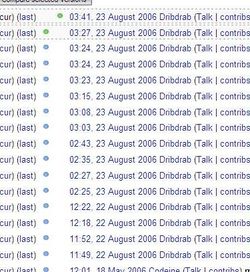Wikocracy
“Wikocracy is a form of government so intolerable that we have to alter it every six seconds.”
Wikocracy is a form of government in which it is recognized that ultimate authority belongs to the people, who have the right to decide what is morally and socially acceptable for the citizens to live in harmony.
In short, a wikocracy is a government that anyone can edit. Even you.
Etymology[edit | edit source]
Like all other forms of governance, "Wikocracy" is derived from an ancient language nobody speaks, probably Greek, Latin or most likely Gobbledegook. The meaning of the root word is widely believed to be "The Free People" or similar.
Its use has been widely accepted and many experts view its inception into Ye Olde Dyctsionayree (now known as the Bible) in 135 B.C. as a major turning point in the world's acceptance of such a government system.
History[edit | edit source]
Wikocracy is the earliest political system known to men. As such, controversy surrounds the exact history of this concept as most historical sources simply mention it as "The Free System in use since before Time". However on January 15 2001, new evidence was unearthed in what was then Greece in the form of a DVD carefully preserved in a tomb six feet underground. The DVD is believed to be from 400-200 B.C.
The Hi-Definition video footage (in black and white of course, but still Hi-Definition) shows Eunotesthis, the most brilliant philosopher, philander and philistine of his time, recounting how he invented the concept. Experts are still deciphering the exact vocabulary of the archaic language used, but it is generally accepted among academic circles that the idea sneaked up on Eunotesthis while he was taking a bath and hit him on the head.
It is also known that in his haste to communicate his idea to the King, Eunotesthis ran across a football stadium by accident, inventing streaking at the same time.
Basic Concept[edit | edit source]
Due to the constant flux experienced in wikocratic nations, it is hard to come up with a definitive, professional concept that encompasses all possibilities.
However, the most prominent feature in all wikocratic nations thus far is the flux itself. All the laws of the country, all public policies, from the national bird to nuclear weapons protocols, are written on some type of Wiki document, which means the laws are in a constant state editing. This makes wikocracy 4 times more efficient than the leading republic, democracy, military dictatorship, constitutional monarchy, and mullahcracy put together.
Editing Protocols[edit | edit source]
- Actually deleting
junktext from the documents is discouraged, while using <s> and </s> tags to strike it out is favoured. It is good to make the constantly revised nature of thegospellaw apparent. - It's generally considered rude in most wikocracies to disturb someone in the middle of editing the law. If both parties are editing the law simultaneously, the conflict should be resolved by dice rolls, vote recounts, flame wars, constant re-editing, vandalism of userpages etcetc.
Government[edit | edit source]
- The government is put into power by, you guessed it, editing a special Wiki document only unlocked for a period of 3 months every 5 years.
- During this 3 months citizens are expected to edit the page at least once to show their support. Nonloyal citizens who do not do so may have their userpages
vandaliselectively reconstructed by whoever feels like it.
- The reigning party is the one who has the most loyalists sitting glued to their computers frantically editing away at incriminating sections of the Constitution and the special page.
Wikopolitics[edit | edit source]
Frequent observations by social scientists have culminated in a 1000-page book known as Wikopolitics: The Unedited Survival Guide. This book compiles all the tactics and strategies employed by successful citizens of Wikocratic countries to reach their goal. In these countries, the book has remained consistently on top in sales figures. The book is now in its 372091st 372092nd 372093rd 372094th 372095th revision. Excerpts from the book are listed below.
- It is vitally important that before you do anything, you check to see if what you are about to do is legal, and if necessary, make it legal. This is important.
- Most prominent lawmakers and politicians find it necessary to hire a secretary to constantly keep tabs on the current status of ex post facto laws and make sure everything they ever did always remains legal, because is quite common for people to be suddenly imprisoned due to some past behavior being retroactively criminalized by a new law. Just one phrase inserted into an innocuous paragraph which by law anyone canNOT JAJAJA edit can put anyone into the CIA, FBI, NSA and MTV's Top 10 Most Wanted in... however long it takes a few bytes of information to shoot around cyberspace.
- Novice lawmakers need to be quick on their typing. A mature wikocracy has a well-ingrained elite caste composed of moderators and veteran lawmakers who immediately pounce on any new law they don't like -- and sometimes, laws that they do like but want to torpedo out of spite because they didn't write it --looking for any and all excuses to delete them. Many of these excuses can be legitimate, but that doesn't necessarily mean they always are. Some excuses are as follows:
- Not Notable. Supposedly, the law is about something most people don't even recognize, but in wikocratic politics it means that the elite caste has no idea what the law is about, or wishes that the masses do not learn about the subject.
- POV. Supposedly, the law is based on a biased point of view, and is therefore unusable. Just about everyone is biased, except for the man they call Some. Some opinions are so phenomenally unbiased that invoking them on the subject of your law is a good way to get your law passed.
- When an unfavourable law is used against them the most commonly used tactic is to demand the right for a lawyer as granted in
Article Iepisode 2 of CSI, and while the court is assembled, the lawmaker will simply demand recesses, vote recounts, protests, witnesses and other funny court lingo of sorts until his subordinates can edit the law.
- Laws may be kept relatively stable via the use of standard Wiki tactics. Simply write a new and highly controversial law to distract attention from your more subtle real goals. People will be so busy trying to fiddle with your new law that the pressure will be taken off of your other exploits.
Criticism[edit | edit source]
As with all other political systems, there are a bunch of smartasses whose job is to constantly ridicule how Wikocracy can never work out. One can only hope that these people have read about Arthur C. Clucke's Third Law of Prediction ("Any technology sufficiently advanced is indistinguishable from magic. Consequently, anyone too stupid to understand a concept will think it magic"). The points are shown for comedic effect since everyone knows these problems do not exist, having been edited out by the government.
- Server crashes, hacking and other such incidents due to overloading. To prevent people from overloading the servers, administrators have decided to randomly unplug and replug power cables to make the votepage randomly unaccessible.
- There exists fearless underground organisations who bravely stare bannination in the face and vandalise the votepage in favour of the party they support, at great risk to themselves.
Wikocratic Countries[edit | edit source]
- New Somalia
- The United States
- Wikiland
- List is being revised for the 21st century. Zimbabwe is a candidate for this list.
Applications beyond the country level[edit | edit source]
Some brilliant people realised after decades that the system could also be applied to articles written on the Internet. The term "wiki" is thus derived from "wikocracy", and is used to describe a website which, like wikocracy, allows users to modify its content. The result was a primitive form of online encyclopedia which did not work out well.
The idea was never popular, however, as people were more interested in editing their government than some boring old website. As such, wikocracy for websites was later denounced as stupid and plain incofuckingherent.


